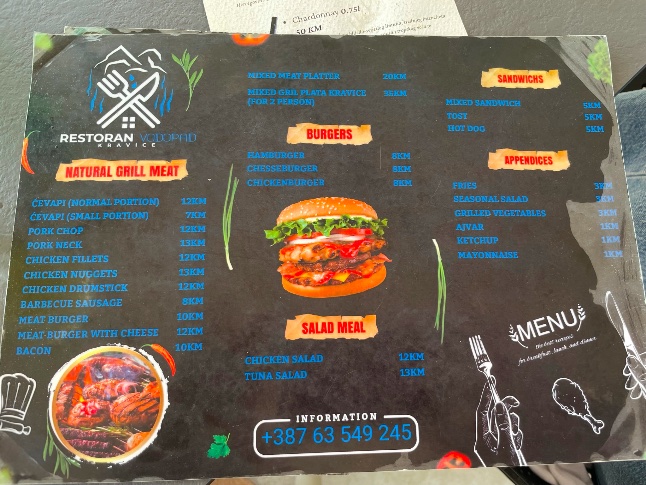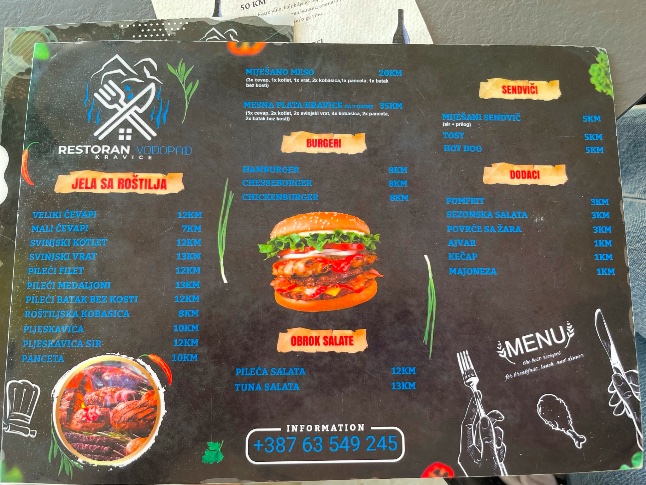Bosnian menu
« previous post | next post »
Nick Tursi sent in this Bosnian menu from a cafe near Kravica waterfalls in Herzegovina:
Some of the entries are amusing. For example, "dodaci" is rendered as "appendices" — it includes things like fries, seasonal salad, grilled vegetables, ketchup, and mayonnaise. Also under this category is "ajvar", which signifies roasted red pepper sauce / spread / relish (sometimes with eggplant, I believe). I'm not sure, but I think "dodaci" means "trimmings; accessories". At least for me, the most idiomatic English equivalent here would be "condiments", but I certainly am no authority on this subject.
No matter the occasional linguistic infelicity, the menu looks delicious. I will be sure to stop off at Restoran cafe near Kravica waterfalls the next time I am in Herzegovina.
Selected readings
- "BiH" (4/11/20)
- "Central European incomprehensibility" (12/19/16)
- "Multilingual Utica confronts COVID-19" (4/12/20)


mg said,
July 28, 2022 @ 12:09 pm
If "dodaci" includes fries, grilled vegetables, and salads I'd think the closest menu equivalent in English (at least the American version) is "sides".
Victor Mair said,
July 28, 2022 @ 12:15 pm
@mg
I think you're right for the first three items. "Condiments" only works for the last three items.
Andy Stow said,
July 28, 2022 @ 12:30 pm
How about "extras" or "additions"?
Coby said,
July 28, 2022 @ 12:36 pm
The name of the restaurant is actually (though it's a little hard to read on the menu) Restoran Vodopad (=waterfall). It has a 4.8-star rating on Google Maps.
Paul Clapham said,
July 28, 2022 @ 1:09 pm
We can get ajvar here in Western Canada, it comes in jars and if you know where to look you can occasionally find it in supermarkets. It's sort of a condiment but we sometimes eat it on bread or crackers with cream cheese.
Simplicissimus said,
July 28, 2022 @ 1:36 pm
Native B/C/S speaker (with an emphasis on the C):
1) ‘add-ons’ is literally the first thing that comes to my mind for ‘dodaci’, though ‘sides and condiments’ would probably be the best translation in this context;
2) ajvar without roasted eggplant is unimaginable to me, though I’m sure there’s massive regional variation;
3) as it turns out, the B/C/S word ‘ajvar’ and the English word ‘caviar’ both derive from the same etymon, the Ottoman Turkish word ‘havyar’ (which, in turn, derives from the Persian ‘xâvyâr’)—now that I think about it, it’s not unimaginable to me that ‘ajvar’ got its name on account of a vague resemblance to red caviar.
Philip Taylor said,
July 28, 2022 @ 3:26 pm
Amost 30 years ago, I was asked by a Polish friend, himself a fluent English speaker with no trace of a Polish accent, to help improve the English translation of a Polish menu for which he was responsible. The word which proved the most difficult to translate (in the sense that it took longer than any other word or phrase to find the best translation) was dodatki. Jerzy had translated it as "additions", which was meaningful if not exactly idiomatic, and it took quite some time — possibly some weeks — to finally come up with "side dishes". I still don't think I could improve on that, even today.
Sutasu said,
July 29, 2022 @ 7:23 am
>>>Simplicissimus
>>>now that I think about it, it’s not unimaginable to me that ‘ajvar’ got its name on >>>account of a vague resemblance to red caviar.
There's a dish in Slavic and post-Soviet countries which is literally called "eggplant caviar" and "vegetable marrow caviar". "Vegetable marrow" is interesting by itself, I think Zuccini would be more descriptive, but zuccinis are not so widespread in those parts.
Kate Bunting said,
July 29, 2022 @ 9:59 am
I'm wondering why 'meat burger' isn't listed under 'Burgers' !
V said,
July 29, 2022 @ 2:04 pm
As a native Bulgarian speaker, if I had only one of the menus I wouldn't be sure about some of the items, but being able to cross-reference it's perfectly clear. Interesting.
Kate Bunting: The stuff under "burgers" comes between buns, the stuff in the first column does not.
V said,
July 29, 2022 @ 2:15 pm
Plescavica — the thing in the first column translated as "meat burger" — is more the size of a steak than a burger patty.
Terry K. said,
July 30, 2022 @ 1:17 pm
But, V, steaks and burgers both come in a range of size, which overlap, and aren't distinguished by size. (And while plescavica somewhat similar to Salisbury steak, Salisbury steak also isn't steak.)
V said,
July 30, 2022 @ 4:54 pm
Which I why I think it's OK to translate it as "meat burger". The pricing would indicate that there's more meat in it than in the items designated as "burgers", I would think.
rpsms said,
August 2, 2022 @ 1:40 pm
I assume 12KM indicates the number of kilometers one must walk to burn the calories. Useful.
Quinn C said,
August 2, 2022 @ 2:47 pm
In Japanese, a "hanba-ga-" (hamburger) comes with a bun, a "hanba-gu" (hamburg) without. I believe "hamburg" is shortened from "hamburg steak".
V said,
August 3, 2022 @ 5:08 pm
rpsms: 730 kCals, apparently, is the walk — both ways. According to thespruceeats.com , a standard plescavica is 371 kCals. So, pretty close.